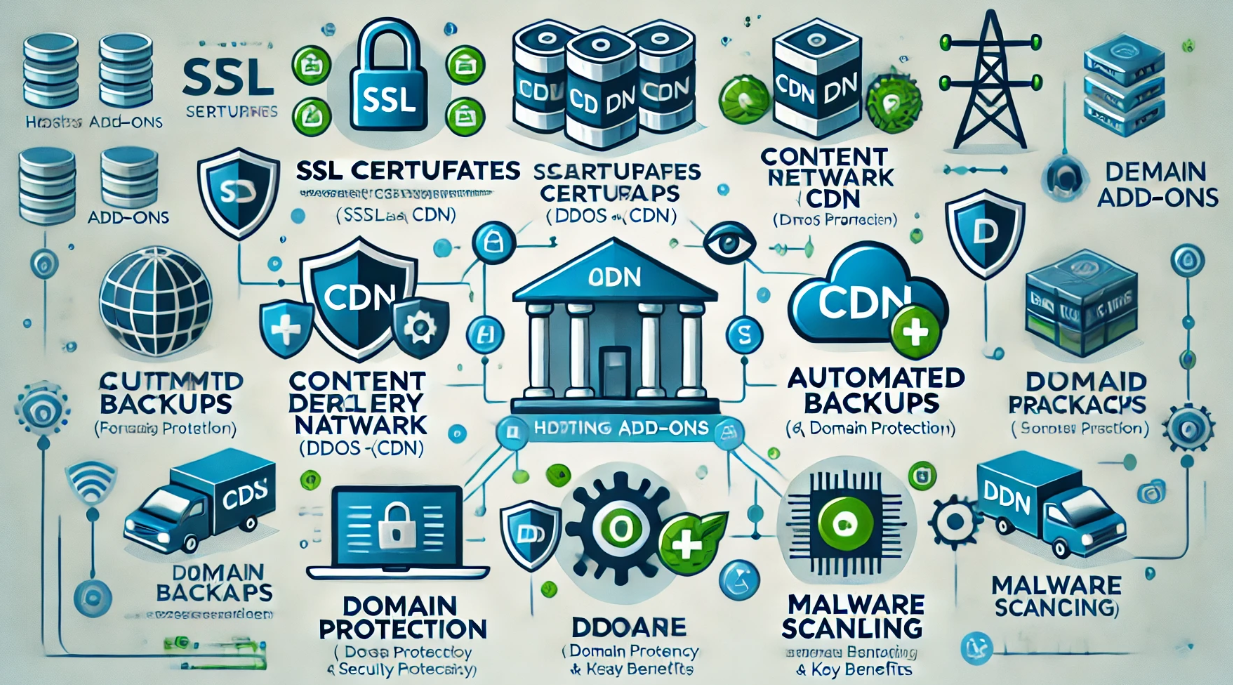How to Monetize Add-Ons in Shared Hosting Plans
Introduction
Shared hosting is a popular choice for individuals and small businesses looking to establish an online presence without breaking the bank. However, hosting providers often operate on razor-thin profit margins due to the low-cost nature of shared hosting plans. The solution? Monetizing add-ons—value-added services that enhance a customer’s hosting experience while generating additional revenue.
In this guide, we’ll explore the best strategies for monetizing add-ons in shared hosting plans, ensuring both profitability and customer satisfaction.
1. Understanding the Value of Add-Ons in Shared Hosting
Many customers opt for shared hosting because it’s affordable. However, as their websites grow, they often require additional features. This presents a golden opportunity for hosting providers to offer premium add-ons that improve site performance, security, and functionality.
Examples of profitable hosting add-ons:
- SSL Certificates – Essential for site security and SEO rankings.
- Automated Backups – Helps customers protect their data with daily or weekly backups.
- Site Speed Boosters (CDN, Caching Services) – Enhances website performance.
- Advanced Security Features (Malware Scanners, Firewalls) – Protects websites from cyber threats.
- Dedicated IPs – Beneficial for email deliverability and SEO.
- Website Builders & Premium Themes – Ideal for non-technical users who need easy website customization.
By offering these value-driven add-ons, you can increase revenue while genuinely improving the user experience.
2. Pricing Strategies for Maximum Profitability
Pricing is a crucial factor in monetizing hosting add-ons. Here are a few effective pricing models:
✅ Bundled Packages – Offer a “Security Bundle” that includes SSL, malware protection, and backups at a discounted rate.
✅ Tiered Pricing – Provide basic, standard, and premium plans with increasing levels of add-ons.
✅ Freemium Model – Offer a free trial for add-ons like backups or CDN, then upsell the full version.
✅ Pay-As-You-Go – Allow customers to purchase add-ons only when needed, such as extra storage or bandwidth.
Pro Tip: Keep pricing transparent and competitive to encourage adoption while maintaining healthy profit margins.
3. Smart Upselling & Cross-Selling Techniques
Effective upselling and cross-selling can significantly boost your revenue from add-ons. Here’s how:
During Checkout: Display recommended add-ons when customers purchase a shared hosting plan.
Email Campaigns: Send targeted emails offering security upgrades or performance boosters based on user activity.
In-Dashboard Notifications: Use subtle pop-ups or banners within the hosting control panel to promote relevant add-ons.
Live Chat & Support Suggestions: Train support teams to suggest add-ons that solve customer pain points (e.g., recommending backups after a website crash).
Example: If a customer frequently exceeds bandwidth limits, offer a CDN service to optimize site performance and reduce load times.
4. Leveraging Affiliate & Reseller Partnerships
Beyond direct sales, you can expand your monetization strategy by partnering with affiliate programs or resellers:
Affiliate Partnerships:
- Partner with SSL certificate providers, premium themes, and security services to earn commissions on referrals.
- Offer a referral program where customers earn credits or discounts for promoting your hosting add-ons.
White-Labeling Add-Ons:
- Resell third-party services under your own brand (e.g., white-label security tools or backup solutions).
- Integrate customized add-on solutions within your hosting control panel to create a seamless user experience.
5. Promoting Add-Ons Through Content Marketing & SEO
To drive more sales, leverage content marketing and SEO strategies to educate and attract potential buyers:
Blog Posts & Tutorials:
- “Why SSL Certificates are a Must for Every Website”
- “How Automated Backups Can Save Your Business”
- “5 Ways to Speed Up Your Website with a CDN”
Video Marketing:
- Create how-to videos explaining the benefits and setup process of your add-ons.
- Share customer testimonials or case studies highlighting improved site performance with add-ons.
Social Media & Webinars:
- Promote limited-time discounts on hosting add-ons.
- Host live Q&A sessions on improving website performance using add-ons.
By educating users and demonstrating real-world benefits, you increase the perceived value of your add-ons, making them easier to sell.
6. Optimizing the User Experience for Seamless Add-On Sales
The easier it is for customers to purchase add-ons, the higher your conversion rates will be. Streamline the buying process with these tactics:
✅ One-Click Add-On Purchases – Simplify the checkout experience by allowing users to add services in one click.
✅ Clear Add-On Descriptions – Use simple, benefit-driven copy to explain why customers need each add-on.
✅ Mobile-Friendly Integration – Ensure that users can purchase add-ons effortlessly from any device.
Pro Tip: Use analytics tools to track user behavior and identify the best-selling add-ons.
Final Thoughts: Scaling Profits with Add-On Monetization
Monetizing add-ons in shared hosting is a win-win strategy—customers get enhanced features, and you generate recurring revenue. By offering valuable, well-priced, and easily accessible add-ons, you can transform your shared hosting business into a highly profitable venture.
Ready to boost your hosting profits? Start implementing these strategies today and watch your revenue grow!

